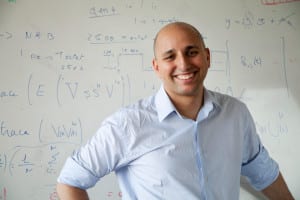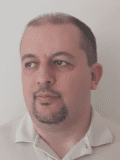Prof. Mérouane DebbahHuawei, France |
 |
Title: Beyond 5G: What will it be?
Abstract: The standardization for 5G wireless systems is maturing and researchers around the world have already started to look at beyond the 5G systems. Although the next G gossip is at a premature stage, this talk aims to provide an overview of the vision, challenges and key enabling technologies envisioned by the wireless community. The talk will mostly focus on the fundamental technologies and will discuss potential research directions to meet the requirements of next generation wireless systems.
Biography: Mérouane Debbah entered the Ecole Normale Supérieure Paris-Saclay (France) in 1996 where he received his M.Sc and Ph.D. degrees respectively. He worked for Motorola Labs (Saclay, France) from 1999-2002 and the Vienna Research Center for Telecommunications (Vienna, Austria) until 2003. From 2003 to 2007, he joined the Mobile Communications department of the Institut Eurecom (Sophia Antipolis, France) as an Assistant Professor. Since 2007, he is a Full Professor at CentraleSupelec (Gif-sur-Yvette, France). From 2007 to 2014, he was the director of the Alcatel-Lucent Chair on Flexible Radio. Since 2014, he is Vice-President of the Huawei France R&D center and director of the Mathematical and Algorithmic Sciences Lab. His research interests lie in fundamental mathematics, algorithms, statistics, information & communication sciences research. He is an Associate Editor in Chief of the journal Random Matrix: Theory and Applications and was an associate and senior area editor for IEEE Transactions on Signal Processing respectively in 2011-2013 and 2013-2014. Mérouane Debbah is a recipient of the ERC grant MORE (Advanced Mathematical Tools for Complex Network Engineering). He is a IEEE Fellow, a WWRF Fellow and a Membre émérite SEE. He has managed 8 EU projects and more than 24 national and international projects. He received 19 best paper awards, among which the 2007 IEEE GLOBECOM best paper award, the Wi-Opt 2009 best paper award, the 2010 Newcom++ best paper award, the WUN CogCom Best Paper 2012 and 2013 Award, the 2014 WCNC best paper award, the 2015 ICC best paper award, the 2015 IEEE Communications Society Leonard G. Abraham Prize, the 2015 IEEE Communications Society Fred W. Ellersick Prize, the 2016 IEEE Communications Society Best Tutorial paper award, the 2016 European Wireless Best Paper Award, the 2017 Eurasip Best Paper Award and the 2018 IEEE Marconi Prize Paper Award as well as the Valuetools 2007, Valuetools 2008, CrownCom2009, Valuetools 2012, SAM 2014 and 2017 IEEE Sweden VT-COM-IT Joint Chapter Best Student paper awards. He is the recipient of the Mario Boella award in 2005, the IEEE Glavieux Prize Award in 2011 and the Qualcomm Innovation Prize Award in 2012.
Prof. Fabrizio Granelli
|
 |
Title: Virtualization and Softwarization in Wireless Networks: Overview and Perspectives
Abstract: Upcoming cellular networks are expected to support an unprecedented step forward in terms of capacity and flexibility. Indeed, 5G requirements for higher throughput, massive access, ultra-low latency and adaptability are strongly steering the attention from the traditional 4G/LTE architecture to more flexible and adaptable solutions. At the same time, in fact, virtualization and softwarization paradigms are gaining momentum, driven by the capability to improve network scalability and flexibility as well as resource allocation offered by Software Defined Networking (SDN) and Network Function Virtualization (NFV).
The keynote is aimed at describing the concepts and technologies behind virtualization and softwarization of wireless networks, and then to illustrate some relevant scenarios and research opportunities for the future (5G systems and beyond).
Biography: Fabrizio Granelli is Associate Professor at the Dept. of Information Engineering and Computer Science (DISI) of the University of Trento (Italy) and IEEE ComSoc Director for Educational Services (2018-19). He received the «Laurea» (M.Sc.) and Ph.D. degree from the University of Genoa, Italy, in 1997 and 2001, respectively. Since 2000 he collaborates with the University of Trento (Italy), currently as coordinator of the Networking Laboratory. Between 2004 and 2015 for a total of eight months, he was visiting professor at the State University of Campinas (Brasil) and in 2016 he was visiting professor at the University of Tokyo (Japan) for one month.
He was IEEE ComSoc Distinguished Lecturer for the period 2012-15 (2 terms), ComSoc Director for Online Content in 2016-17 and Delegate for Education at DISI in 2015-2017.
Prof. Granelli is General Vice-Chair of the First International Conference on Wireless Internet (WICON?05) and General Chair of the 11th, 15th and 18th IEEE Workshop on Computer-Aided Modeling, Analysis, and Design of Communication Links and Networks (IEEE CAMAD ’06-’10-’13). He is TPC Co-Chair of GLOBECOM 2007-2009 and 2012 Symposia on “Communications QoS, Reliability and Performance Modeling”, TPC Co-Chair of GLOBECOM 2014 Symposium on “Selected Areas in Communications – Green Communications Track” and TPC Co-Chair of IEEE ICC 2018 Symposium on “Green Communications and Networking”. He is TPC Co-Chair of the IEEE NFV SDN 2018 conference. He is author or co-author of more than 220 papers published in international journals, books and conferences. He is Senior Member of IEEE, Associate Editor in Chief of IEEE Communications Surveys and Tutorials, and Area Editor of the IEEE Transactions on Green Communications and Networking.
Prof. Rolf Stadler
|
 |
Title: Data-driven network engineering and management
Abstract: We discuss the opportunities of using machine learning for network engineering and operation and map out the design space for applying machine-learning methods. Using the specific example of KPI estimation for network services, we demonstrate how the behavior of a system can be learned from low-level observations, we discuss the tradeoff between overhead and prediction accuracy, and we illustrate the importance of domain knowledge.
Biography: Rolf Stadler is a professor at KTH Royal Institute of Technology in Stockholm, Sweden, and head of the Department of Network and Systems Engineering. He holds an M.Sc. degree in mathematics and a Ph.D. in computer science from the University of Zurich. Before joining KTH in 2001, he held positions at the IBM Zurich Research Laboratory, Columbia University, and ETH Zürich. His group has made contributions to real-time monitoring, resource management, and self-management for large-scale networked systems. His current interests include advanced monitoring techniques and data-driven methods for network engineering and management. Rolf Stadler has been Editor-in-Chief of IEEE Transactions on Network and Service Management (TNSM) 2014-2017 and is currently editing a JSAC special issue on AI for Networking.


